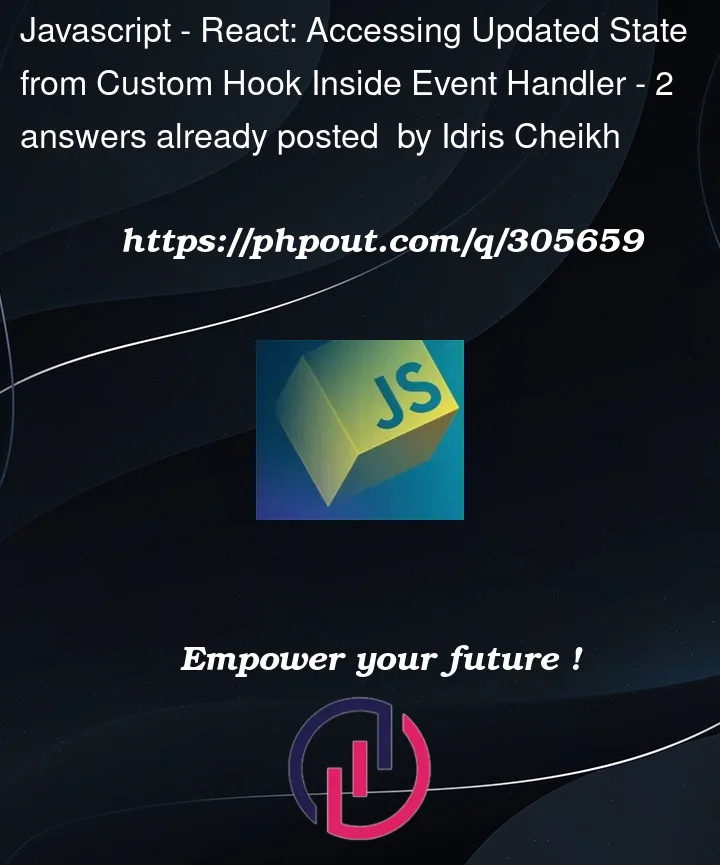In a React component, I’m facing a challenge with state synchronization between an event handler and a custom hook. The event handler updates a state variable, and I need to access the latest value of another state that is derived from a custom hook depending on this updated state.
We use a custom hook, and define a state variable and an event handler.
The event handler sets the value of state variable a to variable c (which depends on the event argument) and then needs to use the latest value of b, which is returned by a custom hook that depends on a.
function MyComponent(props) {
const [a, setA] = useState(null);
const b = useCustomHook(a);
const eventHandler = useCallback(async (event) => {
try {
const c = event.data;
setA(c);
if (b) { // we need to use b here, but it is stale (one step behind)
// logic
}
else {
// more logic
}
} catch (e) {
console.error(`Error:`, e);
}
}, [b]);
}
The issue is that b is always one step behind the event handler. When running the logic in the event handler, its value has not been updated yet.
How can one access the latest value of b (which depends on a, which depends on c, which depends on event) inside of the event handler?
I have tried using only setting the state variables inside of the event handler and use an effect for the rest of the logic, but the effect does not only run when the event handler is triggered.
What solution would be in line with the React paradigm? How can I restructure my code to solve this issue?
Addendum. I originally posted the simplified problem above which abstracted away the details of my use case, but I understand now that, sometimes, seeing the actual code can help provide a tailored answer to the problem. If you can think of a solution that is more React-friendly than the solution that I posted as an answer to this question, I would be glad to know about it!
Below is the code I had before I found a solution to my problem.
const [currentNode, setCurrentNode] = useState(null);
const dispatch = useCustomDispatch();
const isUITreeNodeOpen = useCustomSelector('isUITreeNodeOpenSelector', currentNode?.id);
const cellDoubleClickedListener = useCallback(async (event) => {
try {
const UITreeNode = event.data;
setCurrentNode(UITreeNode); // setA(c)
if (!UITreeNode.folder) {
if (isUITreeNodeOpen) { // if(b)
await serviceWorkerInterface.getAPI().switchToTab(UITreeNode);
}
else {
await chrome.tabs.getCurrent()
.then((currentTab) => {
dispatch('openBookmarkThunk', {UITreeNode, currentTab})
});
}
}
} catch (e) {
console.error(`Failed to open the bookmark or switch to it:`, e);
}
}, [isUITreeNodeOpen]);




2
Answers
After a lot of brainstorming, code writing and debugging (with the help of the great ChatGPT), I finally came up with some code that seems to solve my problem. It may not be well-designed, simple, efficient, aligned with React's best practices, etc., but it does seem to work correctly in my use case.
I would be glad to get feedback on this solution, and if you know of a more efficient, React-friendly way of handling this problem, I would love to know about it!
Below is a revised version of my code that aims to provide a solution to the simplified problem (using a, b, and c) that I originally posted.
Implementation:
Usage in MyComponent:
I ll suggest to use useEffect hook and useRef (to avoid rendering problems) :
Remove b as a dependecy from useCallback.
If this is not helping , please put that in a code sandbox, so we can try different solutions.